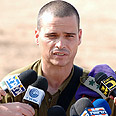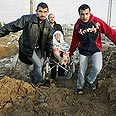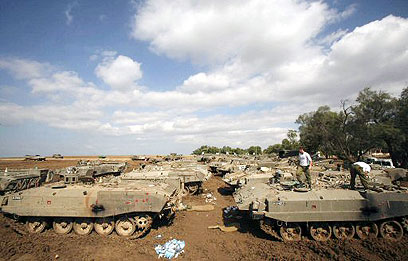

Givate Brigade commander Col. Yoel Strick was pleased as his forces left the area of Beit Hanoun after a weeklong operation.
"We proved we can operate in every type of environment," he said on Tuesday, summing up operation 'Autumn Clouds' in northern Gaza. He sees the army's achievements as up to par with the objectives set for the operation. "We moved as we wished in Beit Hanoun, searched the streets and almost every house," says Col. Strick, "the terrorists made quite a few mistakes when they sent out rocket launching cells and allowed us to hit them in such an unprecedented way."
One IDF soldier was killed in the operation and several more were wounded.
The military proclaimed the operation as aimed at reducing the number of Qassam rockets launched daily across the border, locating wanted terrorists and seizing explosives and weapons in an attempt to impair the ability of terror groups from using them to manufacture the rockets. The army clarified before the operation that not all of the operations successes would be immediately felt.
Col. Strick reiterates that point: "This operation does not provide a solution for everything that is going on in Gaza, but it will certainly have an important effect. It's also about the many arrests we made, which we hope will provide new information about the terror infrastructure. It’s wrong to connect it directly to rocket figures. The goal was to operate inside the town, in the areas that are considered the most crucial core of the infrastructure, and the fact is that in the end we moved through those areas freely, without being shot at."
Col. Strick says that the forces also uncovered five weaponry manufacturing facilities. Buildings used as 'laboratories' where missiles and explosives were prepared. Regarding the situation of the enemy as was reflected throughout the operation Strick says: "Hamas is beginning to organize itself. They're a more coordinated organization, there's a clear division of responsibilities and better communications systems."

IDF forces preparing to leave Beit Hanoun (Photo: Reuters)
Regarding the local Palestinian population Col. Strick admits that the humanitarian situation in Gaza is very difficult: "The situation is miserable and reminiscent of the familiar images from refugee camps. It's not easy to see the way they're trying to maintain their daily lives there. It was clear that an operation of this stripe would force us to operate from areas populated with civilians and that we would have to take every precaution not to harm them. There were only six civilian fatalities; I can say that I'm proud of the outcome considering the scope of the operation. I have no problem with our moral standing."
During the operation Col. Strick met in person with the director of the Beit Hanoun hospital. "I asked him what equipment he was missing and we made sure he got it," says Col. Strick, adding that "we didn't go in to holy sites or hospitals, the terrorists did however, often entering these places with arms."
He says however that when one looks at what the future might entail it is certainly possible that the terror groups will try to rehabilitate the damage rendered to their infrastructures in Beit Hanoun.















